In recent months, Bishkek city officials have been frantically trying to improve public transportation in an effort to reduce traffic jams and ease commutes.
This is an incredibly difficult task, given that they can’t press pause to evaluate the whole transportation network, pluck out pesky infrastructure, and replace it with something shiny and new without disrupting an already stressed system.
The city has staked its transportation future on buses, increasing the size of the municipal fleet from just over 100 to almost 800 units in 2023. These buses are meant to replace Bishkek’s marshrutka system, which has shriveled in recent years due to financial unfeasibility and the mayor’s office shutting down minibus lines in the city center.
A fleet of battery-electric buses to be purchased with $50 million in funding secured from the Asian Development Bank are meant to replace another form of transportation: trolleybuses.
Bishkek’s first trolleybus line began operating in 1951, and since then has expanded to 11 routes across the city. Earlier this spring, the mayor’s office explained it was considering dismantling the capital’s trolleybus system and transferring the vehicles to Osh, Kara-Balta, and Tokmok. (Naryn also has a trolley line, but apparently did not need the buses.)
Civil society sprang into action. On May 2, activists with the initiative “Save the Bishkek Trolleybus” posted a petition on Avaaz.
Arguments to protect the trolleybus system are broad in scope. While the mayor’s office put forward a rationale that the trolleys are old-fashioned and bad for the environment, activists and urban development experts have pointed out that trolleybuses are actually the most ecologically friendly form of transport in the city. The European Bank for Reconstruction and Development provided loans and grants to replace 80 percent of Bishkek’s trolleybus fleet, and the new vehicles started carrying passengers in 2018.
As the petition racked up signatures, Bishkek’s City Council put out a proposal to back up the mayor’s office’s initial pitch to transfer trolleybuses to other cities in Kyrgyzstan.
Peshcom, an development initiative, noted that Kyrgyz law requires a one month period for public discussion before making major policy changes. In theory, Bishkek authorities could not begin the work of transferring the trolleybuses until July 6 at the earliest.
But on June 19, employees of the mayor’s office began to dismantle the electric trolleybus lines on Baitik Batyr, a central north-south road that spans the entire city.
On June 21, Kadyrbek Atambayev – one of former president Almazbek Atambayev’s sons and a deputy on Bishkek’s City Council – posted a harsh response to the trolley line’s dismantling on Facebook.
“Starting to dismantle without finishing the public discussion and without a decision from the Bishkek City Council looks like [the mayor’s office] wants to humiliate the public and the City Council,” Atambayev wrote. “This is a blatant disrespect for the procedures and rules put in place to protect the interests of the city’s residents.”
By the last week of June, the coalition of citizens pushing to save the trolleybus had widened to include socialists, urban development experts, bike infrastructure advocates, and environmentalists. As of June 28, 1,475 people had signed the petition, with a boost in signatures following three creative public demonstrations.
On June 26, “Save the Bishkek Trolleybus” and Peshcom organized a photowalk on Erkindik Boulevard. Participants snapped pictures of the trolleys, which, in addition to photos submitted online, would be printed out for a moving exhibition on June 28. The exhibition took place on a trolleybus and, after local police got involved, in Gorky Park (the designated spot for civic demonstrations without a permit).
While the photo exhibition was happening, Bermet Borubayeva – the director behind a documentary film about smog in Bishkek – was also advocating to save the trolleybus. Standing at the front of a trolleybus, Borubayeva apologized to passengers for interrupting their ride before explaining the risks facing this form of transport. In an Instagram video of the action, Borubayeva moves with the rhythm of the trolley, moving aside for new passengers without skipping a beat in describing the mayor’s office’s approach to shutting down the trolleybuses.
It will likely prove difficult to roll back the mayor’s office move to start dismantling trolleybus lines on Baitik Batyr. But if the activists can link up with city council representatives and labor (after all, if the trolleybuses go out of operation, several hundred drivers and operators will be out of work), the coalition could interrupt the bigger demolition of the city’s trolley infrastructure.

































